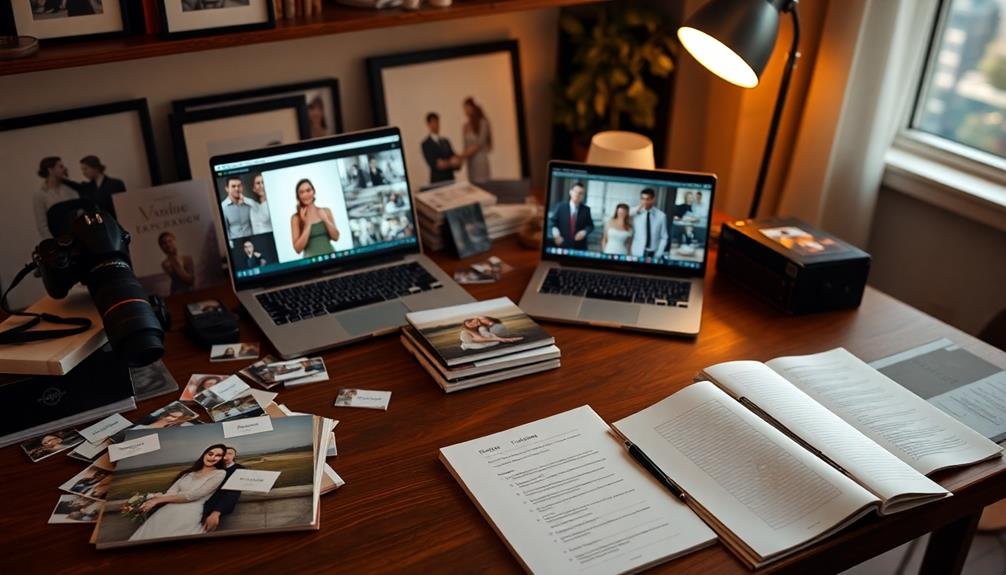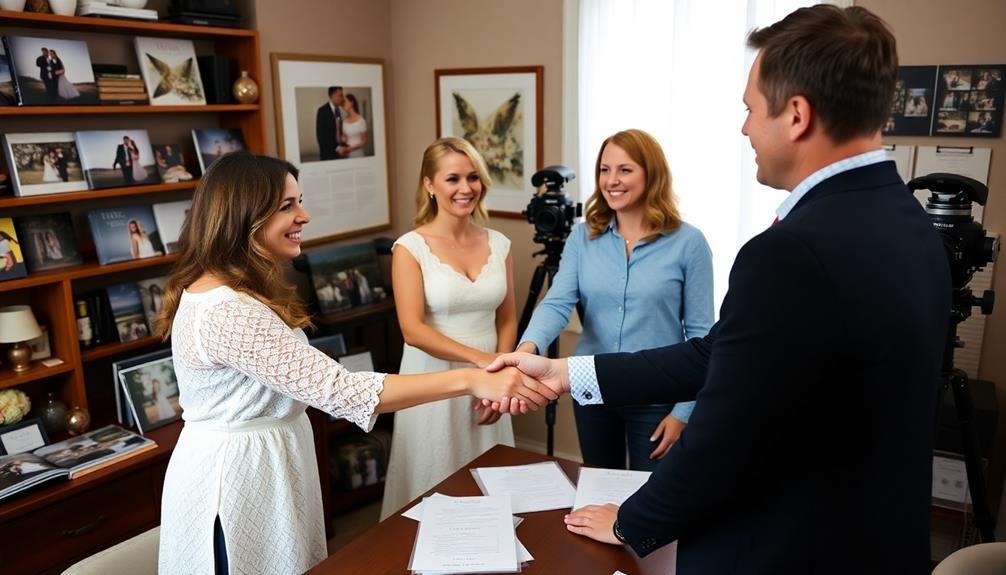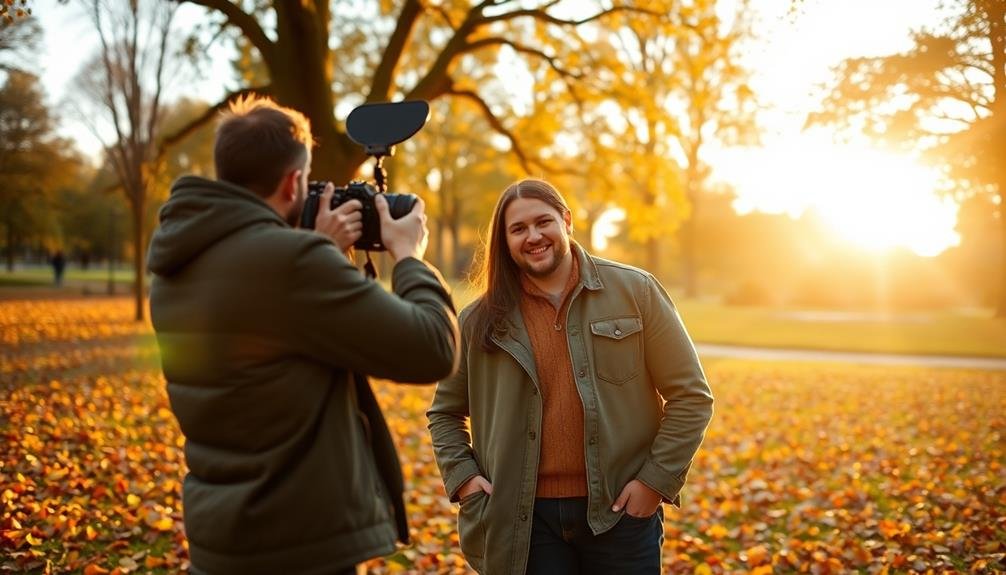Start your budget-friendly wedding photography and videography journey right after getting engaged. Research local vendors, compare packages, and review portfolios to create a shortlist. Allocate 10-15% of your total budget for these services, and track potential options in a spreadsheet. Interview your top candidates, focusing on style, personality, and flexibility. Once you've chosen, negotiate contracts and book with a deposit. Use pre-wedding shoots to build rapport and refine your vision. Create a shot list and timeline for the big day, ensuring you capture all essential moments. Following this strategic approach will help you secure beautiful memories without breaking the bank.
Key Takeaways
- Begin researching and budgeting for photography and videography immediately after engagement, allocating 10-15% of total wedding budget.
- Create a shortlist of budget-friendly vendors 9-12 months before the wedding, reviewing portfolios and comparing packages.
- Book your chosen photographer and videographer 6-8 months in advance, negotiating contracts and securing dates with deposits.
- Schedule engagement photos or pre-wedding shoots 3-6 months before the wedding to build rapport and gain camera comfort.
- Finalize shot lists, timelines, and specific requests with your chosen professionals 1-2 months before the wedding day.
Engagement: Start Your Search

Your engagement marks the perfect time to begin searching for budget-friendly wedding photography and videography options. Start by researching local photographers and videographers, focusing on those who offer affordable packages.
Look through their portfolios to get a sense of their style and quality. Don't forget to check online reviews and ask for recommendations from recently married friends or family members.
Create a shortlist of potential candidates and reach out to them for initial consultations. During these meetings, discuss your vision, budget constraints, and specific needs.
Ask about their experience, equipment, and backup plans in case of emergencies. Inquire about package options and any potential customizations to fit your budget.
Consider hiring a photographer who offers engagement photo sessions as part of their wedding package. This can be a cost-effective way to get professional photos for save-the-dates or wedding invitations while also getting to know your photographer before the big day.
It's also an opportunity to become more comfortable in front of the camera and provide feedback on the photographer's style.
Research and Budget Planning

Researching and planning your budget for wedding photography and videography is essential for keeping costs under control. Start by determining how much you can allocate to these services within your overall wedding budget. Typically, couples spend 10-15% of their total budget on photography and videography combined.
Next, research local photographers and videographers in your area. Look at their portfolios, read reviews, and compare pricing packages. Don't forget to check social media platforms for up-and-coming talent who may offer more competitive rates.
Create a spreadsheet to track potential vendors, their services, and prices.
Consider what's most important to you: Do you want full-day coverage or just key moments? Are you interested in additional services like engagement shoots or photo albums? Prioritize these elements to help focus your search and budget allocation.
Be open to creative solutions that can save money without sacrificing quality. For example, you might hire a photographer for the full day and a videographer for just the ceremony and reception.
Or, consider booking a package deal that includes both services at a discounted rate.
Shortlisting and Interviewing Candidates

After compiling your list of potential photographers and videographers, it's time to narrow down your options. Review their portfolios carefully, focusing on their style, quality, and consistency. Pay attention to how they capture emotions, lighting, and significant moments.
Create a shortlist of your top 3-5 candidates based on these factors and your budget.
Next, reach out to your shortlisted professionals to schedule interviews. Prepare a list of questions to ask during these meetings, covering topics such as:
- Their experience with weddings similar to yours
- Their approach to capturing candid moments
- Their backup plans for equipment failures or emergencies
During the interviews, assess their personality and communication style. You'll be spending a significant amount of time with them on your wedding day, so it's essential that you feel comfortable working together.
Don't hesitate to ask for references from past clients and follow up on them.
After the interviews, compare your notes and impressions. Consider factors like professionalism, flexibility, and how well they understand your vision.
Make your final decision based on a combination of their portfolio, interview performance, and your budget constraints.
Booking and Contract Negotiation

Securing your chosen photographer and videographer is the next crucial step in your wedding planning process. Once you've selected your preferred professionals, it's time to book their services and negotiate the contract terms.
Start by confirming their availability for your wedding date and discussing the package details. Be clear about your expectations and budget constraints.
When reviewing the contract, pay close attention to the terms and conditions. Confirm that all agreed-upon services, timelines, and deliverables are clearly stated.
Don't hesitate to ask questions or request modifications if needed. Discuss payment schedules and any potential additional costs, such as travel expenses or overtime fees.
Consider negotiating for added value, such as extra editing time or additional prints, rather than focusing solely on price reductions. If you're booking well in advance, ask about any early booking discounts.
Be prepared to provide a deposit to secure your date, but make sure you understand the refund policy in case of unforeseen circumstances.
Pre-Wedding Shoots and Preparations

Pre-wedding shoots offer a fantastic opportunity to build rapport with your photographer and get comfortable in front of the camera. These sessions typically take place a few months before your big day and can be used for engagement photos or save-the-date cards.
To make the most of your pre-wedding shoot while staying budget-friendly, consider using local parks or meaningful locations that don't require permits.
When preparing for your wedding day photography, communication is key. Schedule a meeting with your photographer to discuss your vision, must-have shots, and any specific concerns.
Create a shot list of essential moments and family groupings to guarantee nothing is missed. You'll also want to prepare a detailed timeline of your wedding day, including buffer time for photos.
To streamline your wedding day preparations:
- Gather all accessories, invitation suites, and meaningful items for detail shots
- Designate a point person to help coordinate family members for group photos
- Choose getting-ready locations with ample natural light to enhance your photos
Frequently Asked Questions
How Can We Reduce Photography Costs Without Compromising Quality?
You can reduce photography costs by hiring a newer photographer, opting for fewer hours of coverage, choosing digital-only packages, DIYing your photo album, and considering off-peak dates. Don't skimp on talent, but negotiate package details to save money.
Should We Hire Separate Photographers and Videographers or a Combined Service?
You'll often save money by hiring a combined service. They're experienced in coordinating both aspects seamlessly. However, if you have specific style preferences for photos and videos, separate professionals might better meet your unique vision.
What Backup Plans Should Photographers Have for Equipment Failures?
You'll want your photographer to have backup cameras, lenses, and memory cards. They should also bring extra batteries and chargers. It's smart to ask about their contingency plans for equipment failures before booking their services.
How Do We Handle Family Members Who Want to Take Photos?
You should politely explain to family members that you've hired a professional photographer. Encourage them to enjoy the moment and suggest a designated time for family photos. You can also offer to share the official photos later.
Are Drone Shots Worth the Extra Cost for Wedding Photography?
Drone shots can be worth the extra cost if you're after unique aerial perspectives of your venue or large group shots. They'll add a cinematic touch to your wedding video, but consider your budget and venue restrictions before deciding.
In Summary
You've now got a clear roadmap for securing budget-friendly wedding photography and videography. Remember, it's all about planning ahead, doing your research, and communicating effectively with potential vendors. Don't rush the process; take your time to find the right fit for your style and budget. With this timeline, you'll be well-prepared to capture your special day beautifully without breaking the bank. Now go forth and create those lasting memories!

I’m Sarah, the creator and writer behind this site. I’m a wife and a mother of two wonderful kids who keep me on my toes and inspire me daily. My passion lies in creating and organizing memorable events and group activities, where people can come together and make lasting memories.





Leave a Reply